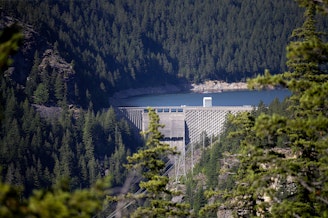Elon Musk Funds $100 Million XPrize For Pursuit Of New Carbon Removal Ideas

Elon Musk is donating $100 million to fund a competition to find new ways to remove carbon from the air or water, in a bid to help fight climate change. The race for the prize – the largest in the XPrize's history – will start on Earth Day and will run for four years, through 2025.
Winning entries will need to show an ability for their idea to scale up to gigaton levels, a benchmark that refers to a billion metric tons of carbon. For the last several years, the world's energy-related CO2 emissions have topped 30 gigatons.
The goal, XPrize says, is to tackle "the biggest threat facing humanity — fighting climate change and rebalancing Earth's carbon cycle. "
XPrize announced the new competition on Monday, more than a month after Musk said on Twitter that he planned to donate $100 million to create "a prize for best carbon capture technology."
At the time, the Tesla and SpaceX CEO cited the need for large-scale removal of carbon, saying, "For now, by far the top priority is accelerating the transition to a sustainable energy economy."
Sponsored
Carbon capture is a longstanding idea that's seen as easing costs and other pressures during the move away from carbon-based fossil fuels and toward renewable energy. But it has been criticized on two fronts.
On one hand, some environmental groups call it a tactic for corporations or governments to counterbalance rather than reduce their emissions — including from fossil fuels such as coal. On the other hand, people who agree that the concept holds promise also acknowledge that the underlying technology is drastically undeveloped.
The new XPrize aims to close the technology gap by spurring innovation. Its backers say they're concerned the world won't be able to prevent global warming by relying solely on cutting emissions.
"For humanity to reach the Paris Agreement's goal of limiting the Earth's temperature rise to no more than 1.5˚(C) of pre-industrial levels, or even 2˚(C), we need bold, radical tech innovation and scale up that goes beyond limiting CO2 emissions," the organization says.
The top prizes include $50 million for the overall winner, along with $20 million for second place and $10 million for third. But many other groups could also get important funding and support, including 25 student teams that will vie for $200,000 in scholarships, according to the XPrize announcement.
Sponsored
Teams will be able to register for the competition on April 22. Some 18 months later, a panel of judges will select 15 teams to receive $1 million each, based on the strength of their submissions. XPrize will issue full guidelines and other details about the competition in April.
This is at least the second XPrize that targets carbon emissions; an earlier competition had a $20 million prize purse. [Copyright 2021 NPR]



